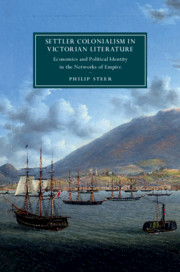 Settler Colonialism in Victorian Literature
Settler Colonialism in Victorian Literature Book contents
- Settler Colonialism in Victorian Literature
- Cambridge Studies in Nineteenth-Century Literature and Culture
- Settler Colonialism in Victorian Literature
- Copyright page
- Dedication
- Contents
- Figures
- Acknowledgments
- Introduction
- Chapter 1 The Transportable Pip
- Chapter 2 Gold and Greater Britain
- Chapter 3 Speculative Utopianism
- Chapter 4 Manning the Imperial Outpost
- Conclusion
- Bibliography
- Index
- Cambridge Studies in Nineteenth-Century Literature and Culture
Chapter 1 - The Transportable Pip
Liberal Character, Territory, and the Settled Subject
Published online by Cambridge University Press: 19 December 2019
- Settler Colonialism in Victorian Literature
- Cambridge Studies in Nineteenth-Century Literature and Culture
- Settler Colonialism in Victorian Literature
- Copyright page
- Dedication
- Contents
- Figures
- Acknowledgments
- Introduction
- Chapter 1 The Transportable Pip
- Chapter 2 Gold and Greater Britain
- Chapter 3 Speculative Utopianism
- Chapter 4 Manning the Imperial Outpost
- Conclusion
- Bibliography
- Index
- Cambridge Studies in Nineteenth-Century Literature and Culture
Summary
This chapter offers a new genealogy of Victorian character by tracing the development and influence of two prominent theories of subject formation that emerged out of the application of political economy to distinct forms of settler imperialism. Edward Gibbon Wakefield’s theory of “systematic colonization” posited a stadialist model of spatial organization as the means of replicating British character, while Alexander Maconochie’s “Mark System” for convict reformation was derived from the temporal logic of bourgeois financial discipline. Their contrasting impacts on the novel demonstrate the complexity and depth of the settler empire’s influence on Victorian culture. Wakefield’s prominent theories spurred a general imaginative expansion of British identity beyond Britain, but the impact of Maconochie’s ideas occurred through more intimate networks of influence. After Charles Dickens adopted the Mark System for his ambitious and long-running philanthropic experiment, Urania Cottage, I argue that it came to infuse his conception of character formation in Great Expectations (1861), notably in the portrayal of Pip, its metropolitan protagonist.
Keywords
- Type
- Chapter
- Information
- Settler Colonialism in Victorian LiteratureEconomics and Political Identity in the Networks of Empire, pp. 35 - 78Publisher: Cambridge University PressPrint publication year: 2020


